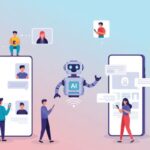Artificial Intelligence (AI) technology is no longer a futuristic concept confined to the realms of science fiction. It’s here, and it’s transforming industries, economies, and even how we live our daily lives. From autonomous vehicles to virtual assistants, AI is revolutionizing the way we interact with technology. But what exactly is AI technology? And how does it work? In this article, we’ll dive into the world of AI, explore its applications, benefits, and challenges, and break down complex terms into digestible insights.
What is AI Technology?
At its core, AI technology refers to machines that mimic human intelligence. Whether it’s solving problems, recognizing speech, or learning from past experiences, AI systems are designed to handle tasks that would typically require human cognitive functions. The most common forms of AI include:
- Machine Learning (ML): A subset of AI that enables systems to automatically learn from data without explicit programming. Essentially, machines develop the ability to improve their performance based on past data.
- Natural Language Processing (NLP): This allows machines to understand, interpret, and respond to human language. Think of virtual assistants like Siri or Alexa – they’re using NLP to comprehend your commands.
- Computer Vision: Another AI subset that enables machines to interpret and understand visual information from the world, much like how humans do.
These different AI types work together to create intelligent systems that can recognize patterns, make decisions, and execute actions autonomously.
The Role of AI in Daily Life
You might not realize it, but AI technology is already a part of your everyday routine. Wondering how? Let’s explore a few practical examples:
- Smartphones: Your phone uses AI to recommend apps, enhance photos, and even suggest replies to your texts.
- Streaming Platforms: Whether it’s Netflix or Spotify, these platforms use AI to analyze your preferences and recommend shows, music, or movies you might like.
- Healthcare: From diagnosing diseases to recommending treatment options, AI is playing an ever-expanding role in modern medicine.
- Autonomous Vehicles: Self-driving cars use a combination of AI technologies, including computer vision and machine learning, to navigate roads and make driving decisions.
With AI already ingrained in various aspects of life, it’s no wonder that the global AI market is expected to grow exponentially in the coming years.
Advantages of AI Technology
While the benefits of AI technology are vast, here are some of the most impactful:
- Increased Efficiency: AI systems can analyze large amounts of data quickly and accurately, reducing the time and effort required for humans to do the same.
- 24/7 Availability: Unlike humans, AI systems don’t require sleep. They can operate around the clock, increasing productivity and minimizing downtime.
- Reduction in Human Error: AI, when designed correctly, can eliminate the margin for error that humans often encounter, especially in tasks that require precision.
- Innovation in Problem Solving: AI enables new solutions to age-old problems. In fields like healthcare, AI is leading the charge in diagnosing illnesses and suggesting treatments faster than ever before.
Challenges of AI Technology
Despite its many benefits, AI technology comes with its own set of challenges:
- Ethical Concerns: There are ongoing debates about the ethical implications of AI, especially when it comes to privacy, job displacement, and decision-making biases.
- Data Dependency: AI systems require massive amounts of data to function properly. Without proper data, these systems might not perform optimally or could even produce biased results.
- Security Risks: AI is also vulnerable to attacks. Malicious entities could exploit AI systems, leading to catastrophic consequences, particularly in areas like finance or national security.
The Future of AI Technology
So, what’s next for AI technology? As AI continues to evolve, it will likely become even more integrated into every facet of our lives. Here’s a sneak peek into what the future holds:
- Enhanced AI Personal Assistants: Virtual assistants will become more intuitive, offering more personalized suggestions and handling complex tasks with ease.
- AI in Education: Personalized learning platforms will use AI to tailor educational materials to individual students, creating a more customized and effective learning experience.
- Healthcare Revolution: AI will continue to disrupt healthcare, with predictive analytics playing a critical role in preventative medicine and AI-driven robots assisting in surgeries.
FAQs About AI Technology
- What is AI technology used for? AI technology is used across multiple industries for tasks such as automating processes, analyzing large datasets, improving customer service through chatbots, and enhancing medical diagnoses, to name a few.
- How does AI learn? AI learns through a process called Machine Learning. In this process, AI systems are trained on large datasets, learning from patterns and making decisions or predictions based on that data.
- Is AI going to replace jobs? While AI technology will automate certain tasks, it is more likely to change the nature of jobs rather than replace them entirely. New roles that focus on managing and developing AI systems are expected to emerge.
- Can AI be biased? Yes, AI can be biased, especially if the data it is trained on is biased. Ensuring that AI systems are trained on diverse and representative data is essential to minimize biases.
- Is AI safe? Like any technology, AI poses certain risks, but these can be mitigated with proper oversight, testing, and security measures. Ensuring that AI systems are ethical and secure is critical to avoiding potential pitfalls.
Conclusion
AI technology is more than a buzzword – it’s the driving force behind many of the innovations we experience today. From improving efficiencies in business to revolutionizing healthcare, AI is unlocking new possibilities across various sectors. However, it’s crucial to address the ethical, security, and societal challenges that come with this powerful technology. As AI continues to grow, its potential for shaping the future remains immense, promising a world where machines and humans collaborate for a better tomorrow.
Authoritative Links:
- https://www.mit.edu/artificial-intelligence/
- https://www.ibm.com/ai
- https://www.turing.ac.uk/research/artificial-intelligence
- https://www.microsoft.com/en-us/ai







